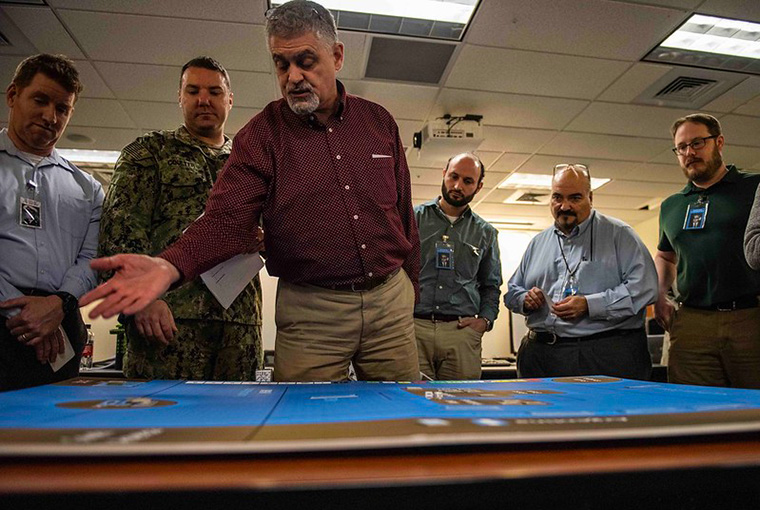War-Gaming 101: U.S. Naval War College Holds War Game Fundamentals Course

For the sixth year, the U.S. Naval War College is holding a war game fundamentals course to teach the war-gaming skills that the college uses to help decision-makers shape the future Navy.
War-gaming is a time-honored role of the college, founded in 1884 as a place of teaching and research on naval issues. Currently, the college’s War Gaming Department, under the umbrella of the Center for Naval Warfare Studies, will conduct as many as eight major war games this fiscal year on behalf of the U.S. Navy and the U.S. Department of Defense.
Professor Shawn Burns sat down to discuss the Jan. 13-17 war-gaming fundamentals course, one of the rare War Gaming Department activities in the year that is unclassified. A retired U.S. Marine Corps helicopter pilot, Burns is director of the course. He also literally wrote the book on war-gaming, a slim volume called “War Gamers’ Handbook, A Guide for Professional War Gamers.”
Q: What’s the goal of the course and who is the audience?
Burns: The purpose of the course is to teach new War Gaming Department faculty members how we ‘do’ war gaming. Some are civilian professors, but most are uniformed military professors who are very skilled and capable in their specialties, but war-gaming is a new area for them.
Other organizations have heard about this course and said, ‘Hey can we come?’ So, this week, we will have people from commands around the [U.S.] Marine Corps, the [U.S.] Navy, the Joint Staff and the Department of State and from the Federal Reserve Bank.
Q: What roles will they learn?
Burns: The war games that we do, it’s like a research project. There’s the game director, who is the research project lead. Then a game designer creates the blueprint that describes the structure of the game. The game developer creates and knits together all the parts needed for players to execute the game. The knowledge manager organizes game files that are often spread over six different internet and gaming intranet networks. There’s an administrative and logistics person who manages player registrations and badging. And we have a rep from our Office of Naval Intelligence Detachment that helps characterize "Red" capabilities reflected in the game.
Q: Can you talk about the history of war-gaming at the Naval War College and the kinds of war games held here now?
Burns: Lt. William McCarty Little was one of the original faculty members at the Naval War College in the late 1800s. He delivered six lectures on war-gaming. The war game was one of the main methods for teaching the students, in addition to classroom work. So from the very beginning of the college, war-gaming was integral to the curriculum.
As time marched on, war-gaming still had a role in the educational piece of the Naval War College. But as the college created a research arm, our primary focus is on analytic research. We help three- and four-star fleet commanders improve their war plans. We work with them to refine and build a war game – a research project -- to address a specific maritime problem.
Q: What’s the impact of this work on national security?
Burns: We are Americans, and we think like Americans. How I was raised and my experience in life have shaped how I see the world. War games can help us see around corners, to take in to account subconscious biases that we have and help illuminate assumptions, especially faulty assumptions.
As we build a war game research project, we also plan how we will collect and analyze war game data. Given the problem articulated by the sponsor and the objectives stated, I’m going to collect these kinds of information during the game, so we provide meaningful feedback to the game sponsor, the fleet commander.
After all of this data has been collected, myself and others will spend two months making heads or tails of it and present results in an analytic post-game report. That document will go to the game sponsor and eventually to the chief of naval operations.
Hopefully we provide insights to the commander. People say history repeats itself. It never does exactly. There will never be another Cuban Missile Crisis, but there can be analogous things. Games can provide ideas to the commander that that person can put it into his or her mental computer. And that may tangibly impact changes to their plans.
At the Naval War College, we like to say that we try to help the chief of naval operations make the Navy of the future and improve the current Navy. Part of that is helping fleet commanders be ready in the near term, and our department is influencing how the Navy fights.
The oldest institution of its kind in the world, the U.S. Naval War College offers graduate education to military officers and national security professionals and is accredited to award the Master of Arts degree. The college serves roughly 600 in-residence graduate students and more than 1,000 distance-education students each year.
